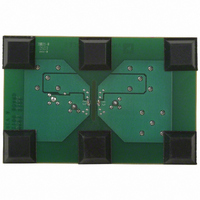ADUM1100EVAL Analog Devices Inc, ADUM1100EVAL Datasheet - Page 6

ADUM1100EVAL
Manufacturer Part Number
ADUM1100EVAL
Description
BOARD EVAL FOR ADUM1100
Manufacturer
Analog Devices Inc
Type
Digital Isolatorr
Datasheet
1.ADUM1100ARZ-RL7.pdf
(20 pages)
Specifications of ADUM1100EVAL
Design Resources
USB Cable Isolator Circuit (CN0159)
Contents
Evaluation Board
For Use With/related Products
ADUM1100
Lead Free Status / RoHS Status
Contains lead / RoHS non-compliant
ADuM1100
1
2
3
4
5
6
7
8
9
Output supply current values are with no output load present. See
the
The minimum pulse width is the shortest pulse width at which the specified pulse width distortion is guaranteed.
The maximum data rate is the fastest data rate at which the specified pulse width distortion is guaranteed.
t
rising edge of the V
Because the input thresholds of the ADuM1100 are at voltages other than the 50% level of typical input signals, the measured propagation delay and pulse width
distortion can be affected by slow input rise/fall times. See the
impact of given input rise/fall times on these parameters.
Pulse width distortion change vs. temperature is the absolute value of the change in pulse width distortion for a 1°C change in operating temperature.
t
recommended operating conditions. t
temperature, supply voltages, and output load within the recommended operating conditions.
CM
that can be sustained while maintaining V
over which the common-mode is slewed.
Dynamic supply current is the incremental amount of supply current required for a 1 Mbps increase in signal data rate. See
supply current variation with logic signal frequency. See the
data rate and output load.
PHL
PSK1
H
is measured from the 50% level of the falling edge of the V
Power Consumption
is the magnitude of the worst-case difference in t
is the maximum common-mode voltage slew rate that can be sustained while maintaining V
I
signal to the 50% level of the rising edge of the V
section for guidance on calculating the input and output supply currents for a given data rate and output load.
PSK2
is the magnitude of the worst-case difference in t
O
< 0.8 V. The common-mode voltage slew rates apply to both rising and falling edges. The transient magnitude is the range
PHL
and/or t
Power Consumption
I
Propagation Delay-Related Parameters
signal to the 50% level of the falling edge of the V
PLH
Figure 5
that is measured between units at the same operating temperature and output load within the
O
signal.
Rev. H | Page 6 of 20
and
Figure 6
section for guidance on calculating the input and output supply currents for a given
for information on supply current variation with logic signal frequency. See
PHL
and/or t
O
> 0.8 V
section and
PLH
that is measured between units at the same operating
DD2
. CM
L
O
is the maximum common-mode voltage slew rate
signal. t
Figure 14
PLH
Figure 5
through
is measured from the 50% level of the
and
Figure 18
Figure 6
for information on the
for information on












